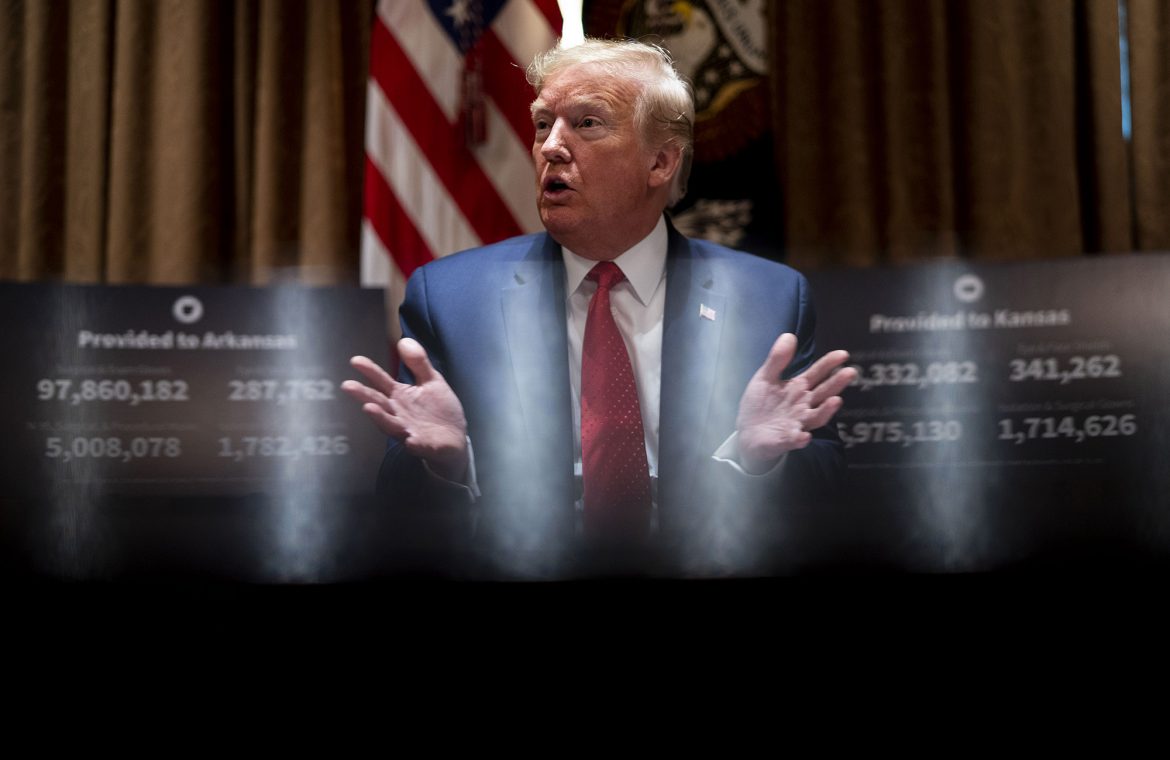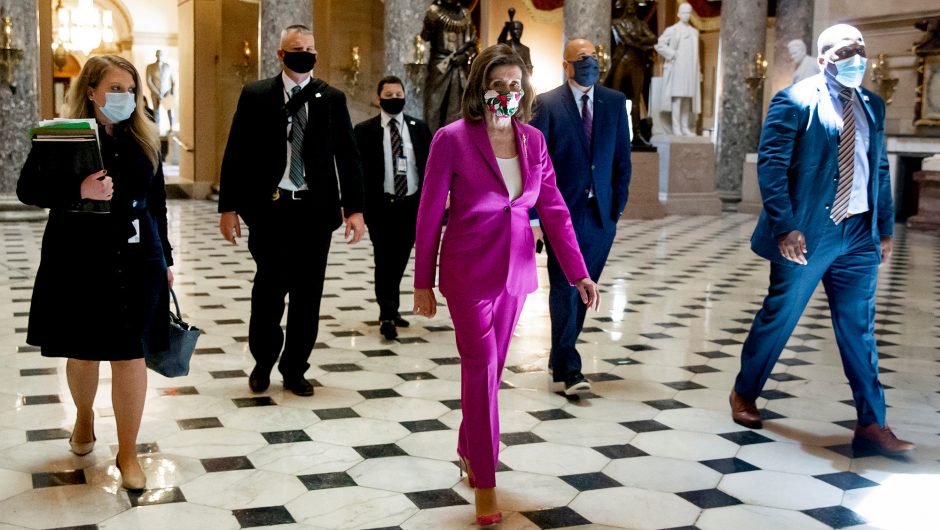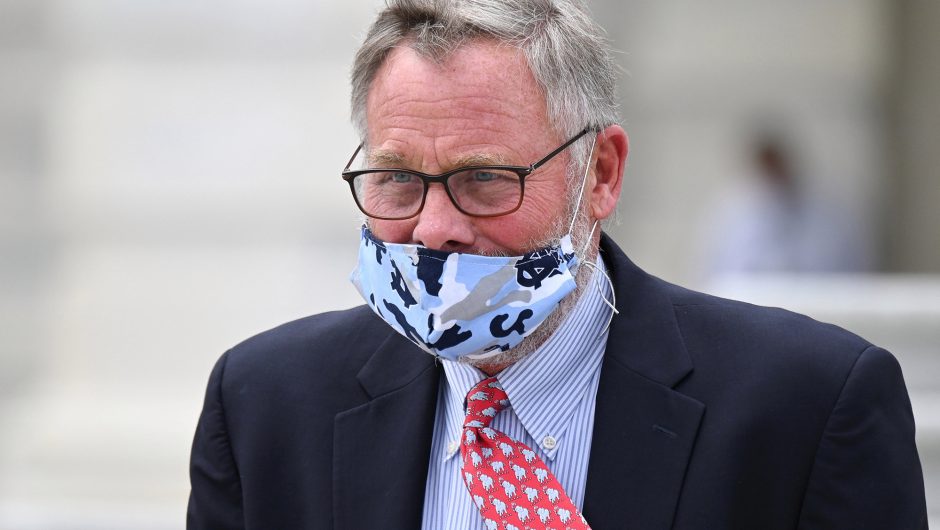More than 600 doctors signed onto a letter sent to President Trump Tuesday pushing him to end the “national shutdown” aimed at slowing the spread of the coronavirus, calling the widespread state orders keeping businesses closed and kids home from school a “mass casualty incident” with “exponentially growing health consequences.”
The letter outlines a variety of consequences that the doctors have observed resulting from the coronavirus shutdowns, including patients missing routine checkups that could detect things like heart problems or cancer, increases in substance and alcohol abuse, and increases in financial instability that could lead to “[p]overty and financial uncertainty,” which “is closely linked to poor health.”
“We are alarmed at what appears to be the lack of consideration for the future health of our patients,” the doctors say in their letter. “The downstream health effects … are being massively under-estimated and under-reported. This is an order of magnitude error.”
The letter continues: “The millions of casualties of a continued shutdown will be hiding in plain sight, but they will be called alcoholism, homelessness, suicide, heart attack, stroke, or kidney failure. In youths it will be called financial instability, unemployment, despair, drug addiction, unplanned pregnancies, poverty, and abuse.
“Because the harm is diffuse, there are those who hold that it does not exist. We, the undersigned, know otherwise.”
The letter comes as the battle over when and how to lift coronavirus restrictions continues to rage on cable television, in the courts, in protests and among government officials. Those for lifting the restrictions have warned about the economic consequences of keeping the shutdowns in effect. Those advocating a more cautious approach say that having more people out and about will necessarily end with more people becoming infected, causing what National Institute of Allergy and Infectious Diseases Director Dr. Anthony Fauci warned in a Senate hearing last week would be preventable “suffering and death.”
But these doctors point to others that are suffering, not from the economy or the virus, but simply from not being able to leave home. The doctors’ letter lists a handful of patients by their initials and details their experiences.
“Patient E.S. is a mother with two children whose office job was reduced to part-time and whose husband was furloughed,” the letter reads. “The father is drinking more, the mother is depressed and not managing her diabetes well, and the children are barely doing any schoolwork.”
“Patient A.F. has chronic but previously stable health conditions,” it continues. “Her elective hip replacement was delayed, which caused her to become nearly sedentary, resulting in a pulmonary embolism in April.”
Dr. Mark McDonald, a psychiatrist, noted in a conversation with Fox News that a 31-year-old patient of his with a history of depression who was attending school to get a master’s degree in psychology died about two weeks ago of a fentanyl overdose. He blames the government-imposed shutdown.
“There are thousands of us out there that don’t agree with the perspective of Dr. Fauci.”
– Dr. Jeffrey Barke
“She had to stay in her apartment, essentially in house arrest as most people here in [Los Angeles] were for weeks and weeks, she could not see her therapist — she could speak to the therapist over the phone but she couldn’t see her in person. She could not attend any of her group meetings, which were helping to maintain her abstinence from opiates … and she relapsed into depression.
“She was just too withdrawn to ask for help,” McDonald continued before noting that due to regulations only six people could be at her funeral. “She was simply trying to escape from her pain… I do blame these actions by the government for her death.”
Fox News asked McDonald, as well as three other doctors who were involved with the letter, if they thought the indirect effects of the shutdowns outweighed the likely direct consequences of lifting them — the preventable “suffering and death” Fauci referred to in last week’s Senate hearing. All four said that they believe they do.
“The very initial argument … which sounded reasonable three months ago, is that in order to limit the overwhelmed patient flux into hospitals that would prevent adequate care, we needed to spread out the infections and thus the deaths in specific locales that could become hotspots, particularly New York City… It was a valid argument at the beginning based on the models that were given,” McDonald said. “What we’ve seen now over the last three months is that no city — none, zero — outside of New York has even been significantly stressed.”
McDonald is referring to the misconception that business closures and stay-at-home orders aimed at “flattening the curve” are meant to reduce the total number of people who will fall ill because of the coronavirus. Rather, these curve-flattening measures are meant largely to reduce the number of people who are sick at any given time, thus avoiding a surge in cases that overwhelms the health care system and causes otherwise preventable deaths because not all patients are able to access lifesaving critical care.
McDonald said that “hospitals are not only not overwhelmed, they’re actually being shut down.” He noted that at one hospital in the Los Angeles area where Dr. Simone Gold, the head organizer of the letter, works “the technicians in the ER have been cut by 50 percent.”
Gold also said the effects of the shutdown are more serious for the vast majority of people than the potential virus spread if it is quickly lifted.
“When you look at the data of the deaths and the critically ill, they are patients who were very sick to begin with,” she said, “There’s always exceptions. … But when you look at the pure numbers, it’s overwhelmingly patients who are in nursing homes and patients with serious underlying conditions. Meaning, that that’s where our resources should be spent. I think it’s terribly unethical… part of the reason why we let [the virus] fly through the nursing homes is because we’re diverting resources across society at large. We have limited resources we should put them where it’s killed people.”
People of all ages, of course, have been shown to be able to catch the coronavirus. And there have been reported health complications in children that could potentially be linked to the disease. Fauci also warned about assuming that children are largely protected from the effects of the virus.
“We don’t know everything about this virus … especially when it comes to children,” Fauci said in a Senate hearing last week. “We ought to be careful and not cavalier.”
Newport Beach, Calif., concierge doctor Dr. Jeffrey Barke, who led the letter effort with Gold, also put an emphasis on the disparity in who the virus effects.
“There are thousands of us out there that don’t agree with the perspective of Dr. Fauci and [White House coronavirus response coordinator] Dr. [Deborah] Birx that believe, yes, this virus is deadly, it’s dangerous, and it’s contagious, but only to a select group of Americans,” he said. “The path forward is to allow the young and healthy, the so-called herd, to be exposed and to develop a degree of antibodies that both now is protective to them and also prevents the virus from spreading to the most vulnerable.”
Dr. Scott Barbour, an orthopedic surgeon in Atlanta, reflected the comments the other doctors made about how the medical system has been able to handle the coronavirus without being overwhelmed, but also noted that the reported mortality rates from the coronavirus might be off.
“The vast majority of the people that contract this disease are asymptomatic or so minimally symptomatic that they’re not even aware that they’re sick. And so the denominator in our calculation of mortality rate is far greater than we think,” he said. “The risk of dying from COVID is relatively small when we consider these facts.”
Gold, an emergency medicine specialist based in Los Angeles, led the letter on behalf of a new organization called A Doctor a Day.
A Doctor a Day has not yet formally launched but sent the letter, with hundreds of signatures from physicians nationwide, to the White House on Tuesday. Gold and the group’s co-founder, Barke, said they began the organization to advocate for patients against the government-imposed coronavirus shutdowns by elevating the voices of doctors who felt that the negative externalities of the shutdowns outweigh the potential downside of letting people resume their normal business.
Donald J. TrumpDoug Mills/POOL/EPA-EFE/Shutterstock
To gather signatures for the letter, Gold and Barke partnered with the Association of American Physicians and Surgeons (AAPS), a doctors’ group that advocates for less government interference in the relationship between doctors and patients, and notably has taken part in legal challenges against the Affordable Care Act and advocated to allow doctors to use hydroxychloroquine on themselves and their patients.
Gold, in a conversation with Fox News, lamented that the debate around hydroxychloroquine has become politicized, noting that it is taken as a preventative measure for other diseases and that the potentially harmful effects of the drug mainly affect people with heart issues.
The drug is approved to treat malaria, lupus and rheumatoid arthritis, but the Food and Drug Administration has said that “[h]ydroxychloroquine and chloroquine have not been shown to be safe and effective for treating or preventing COVID-19.”
The FDA has also warned health professionals that the drug should not be used to treat COVID-19 outside of hospital or research settings.
Gold said she has direct knowledge of physicians who are taking hydroxychloroquine and said that although “we will see” about its efficacy as it is studied more, there have been some indicators that it could be effective at preventing or mitigating COVID-19 and she could therefore understand why doctors might take the drug themselves or prescribe it to their patients.
There is also other research that appears to indicate hydroxychloroquine is not an effective treatment for the coronavirus, which has largely informed the consensus that the risks of the drug outweigh the potential benefits.
Gold, who is a member of the national leadership council for the Save Our Country Coalition — an assortment of conservative groups that aim “to bring about a quick, safe and responsible reopening of US society” — also said she was concerned that her message about the harms of shutdowns is becoming politicized. She said that she agreed with the general principles of the coalition and decided to sign on when asked, but hasn’t done much work with it and is considering asking to have her name removed because people are largely associating her message on reopening the country with a conservative political point of view.
“I haven’t done anything other than that,” she said. “It’s causing a big misunderstanding about what I’m doing so I actually think I’m just going to take my name off because it’s not really supposed to be political.”
Gold also said she is not associated with the Trump reelection campaign in any way, referring to her inclusion in an Associated Press story about the Trump campaign’s efforts to recruit doctors to support the president’s message on lifting coronavirus restrictions. The AP story details a call organized CNP Action, also part of the Save Our Country Coalition, which involved a senior Trump campaign staffer and was aimed at recruiting “extremely pro-Trump” doctors to make television appearances calling for the reopening of the economy as quickly as possible.
Fox News’ Andrew O’Reilly and the Associated Press contributed to this report.








